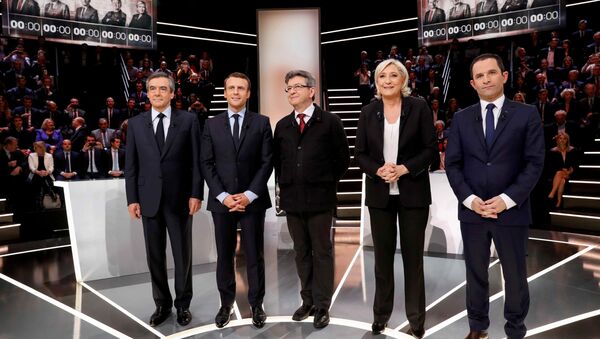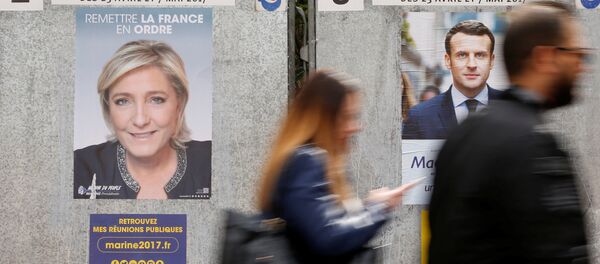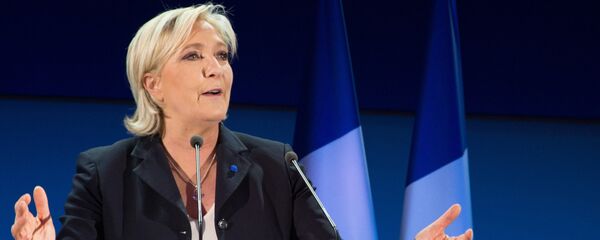Kristian Rouz — France's economic growth has been rather dismal in the past few years despite the gradual improvements in the Eurozone, inspiring the rise of the anti-EU sentiment and right-wing populism in this once-prosperous nation. With the second round of the French presidential election, set for 7 May, fast approaching, the drastic differences in proposed economic policies between the centrist candidate Emmanuel Macron and right-wing Marine Le Pen are putting the economic future of the Eurozone into question.
It is generally thought that Emmanuel Macron, the front-runner in the first round of the presidential election, would continue the economic policies of Francois Hollande, focusing on half-hearted attempts at swaying the intra-EU economic balance in France's favour. However, the powerhouse German economy is dominating in the EU in terms of both intra-union and international trade, boasting a significant trade surplus and decisively advocating tighter monetary policies.
Marine Le Pen, on the other hand, is a reformist candidate, calling for France to leave the EU and the Eurozone altogether in order to achieve full exchange rate and monetary policy independence by reintroducing the franc.
Both candidates have solid a chance of winning the election, and the resulting uncertainty is currently impacting the Eurozone economic activity: many investors are taking a wait-and-see approach to capital allocation. Meanwhile, expectations of the possibly disruptive effects caused by a potential Le Pen victory are driving capital flight for safety, impairing business investment across the Eurozone, which will contribute to a slower Eurozone economic expansion in the second quarter.
"Reforms are absolutely necessary to give France back any economic power," Robert Jan van der Kraat of Randstad Holding NV, a Dutch consulting firm, said. "The French market has a great supply of people due to the unemployment."
The French economy grew 0.4pc in 4Q16 after expanding by 0.2pc in the previous quarter and contracting by 0.1pc in 2Q16.
French unemployment stood at 9.6pc in December 2016 compared to that of 3.9pc in Germany. The high jobless rate is holding down the growth in salaries and wages and is also affecting domestic consumption. In Germany, for example, solid growth is driven by the consumer, whilst solid exports only provide an additional boost to the national economy.
"We are very much dependent on the strength of the French economy overall and it is clear that France needs some improvements and some reforms," van der Kraat said.
Macron's target is to decrease unemployment by 3pc, but the candidate has not provided any detailed plans outlining how he would achieve such an ambitious target. Le Pen said she would hike taxes on the employers hiring foreign workers, thus encouraging French employment and also slightly improving the fiscal situation, because no economy could absolutely abstain from using foreign labour.
The French workforce, however, is amongst the most costly in the EU, due to the legacy of union activity and left-wing policies of the second half of the 20th century. This means that by encouraging domestic hiring, Le Pen would make French-made goods more expensive and thus less competitive on the European and international markets. Subsequently, France's disadvantageous position within the EU would only get worse.
On average, the workforce in France currently costs 20 euros ($21) an hour, compared to 4 euros in Poland and 8 euros in Portugal. If France ditches the euro and devalues the franc, the workforce costs in dollar amounts could be brought down dramatically, boosting France's position in the global marketplace.
It is quite clear that France needs economic reforms, and whilst Macron is an ex-Minister of the Economy in the Hollande cabinet, his legacy is a near-zero economic growth during his tenure in the office between 2014 and 2016. Le Pen, on the other hand, appears to be a radical reformer, and her victory would stir an ever greater degree of economic uncertainty, just like happened in the case with Donald Trump in the US and Brexit in the UK.




